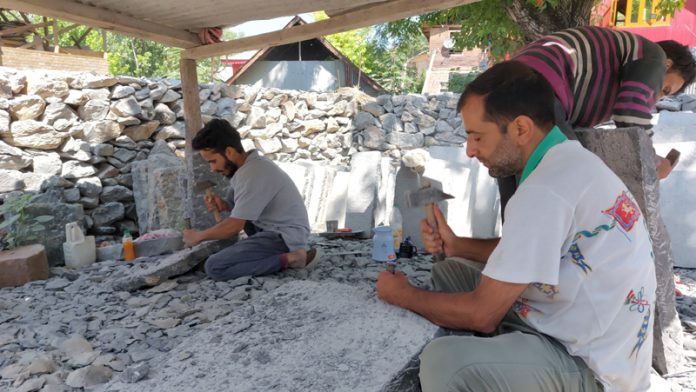
Excelsior Correspondent
SRINAGAR, July 31: Stone carvers in Suderkoot village in the Bandipora area of north Kashmir today expressed deep concerns over their livelihoods as the government’s 2019 mining ban continues to affect their traditional craft.
The ban has severely impacted the stone carving industry, which has been a staple of their livelihoods for generations. “I am a postgraduate and have been involved in this traditional work since 2008. Life was going well until the ban was imposed in 2019,” Shakeel Ahmad, a stone carver, said.
He voiced frustration over the government’s stance: “They say they cannot provide jobs to everyone and that people should seek alternate livelihoods. But when we do, they place hurdles in our way, like banning our work for reasons only they understand. If they are protecting the environment, why ignore issues that truly affect it?”
The carvers, locally known as’sang ‘taraash’-with’sang” meaning stone and ‘taraash’ meaning carvers-lament that their craft is slowly vanishing. The stones, known as ‘devere kane’ or devere stone were traditionally sourced from Sanderkoot’s mountains, buried under up to ten feet of soil and debris. However, mining restrictions since 2019 have created a shortage of this crucial raw material.
Another stone carver, Mustaq Ahmad, highlighted the historic significance of their craft: “Our art is not new. It dates back nearly a thousand years, when it was extensively used in structures. We have been passing down this craft from generation to generation. Despite surviving the test of time, our new government has snatched this livelihood from us,” he said. He added that they demand the revival of this art in the same way the government is promoting other art forms.
Historically, Kashmiri stone carvers began by creating sculptures. With the spread of Islam and the arrival of Sufi saint Mir Syed Ali Hamdani, their focus shifted to crafting gravestones, epitaphs, and later, curbstones, floor stones, and hamam stones used in home construction.

